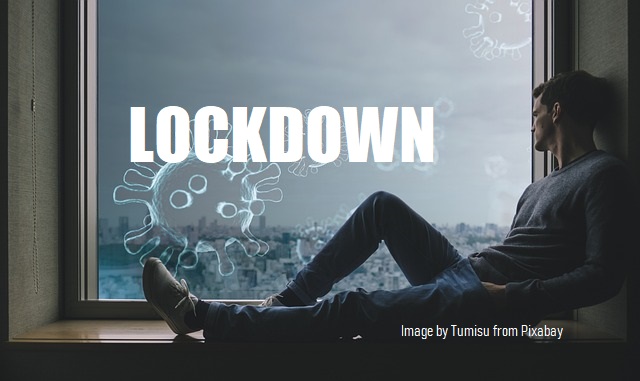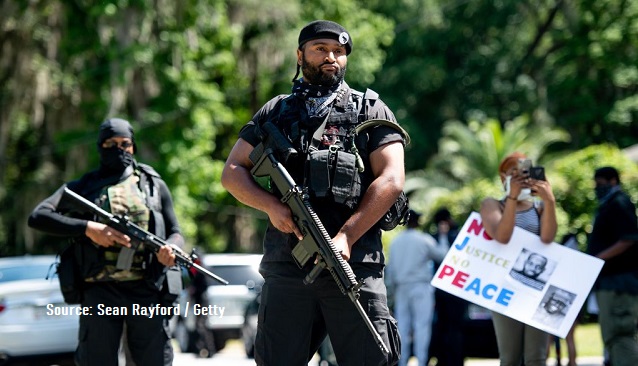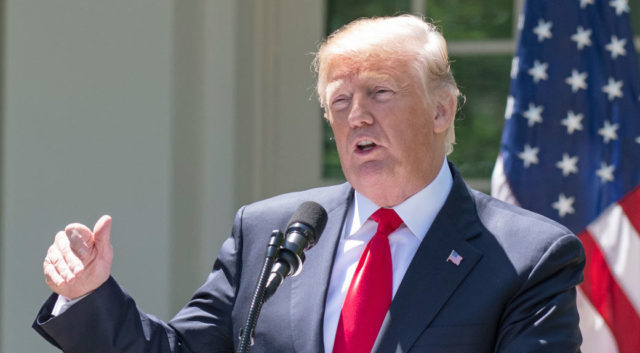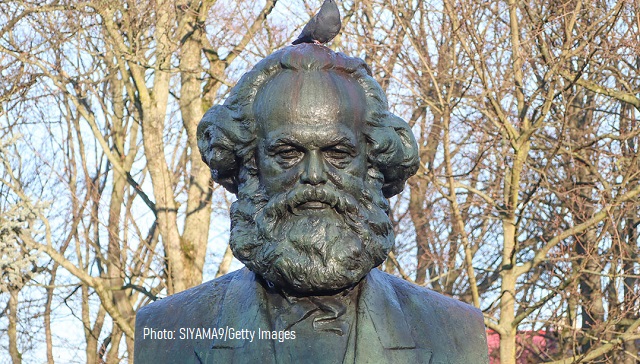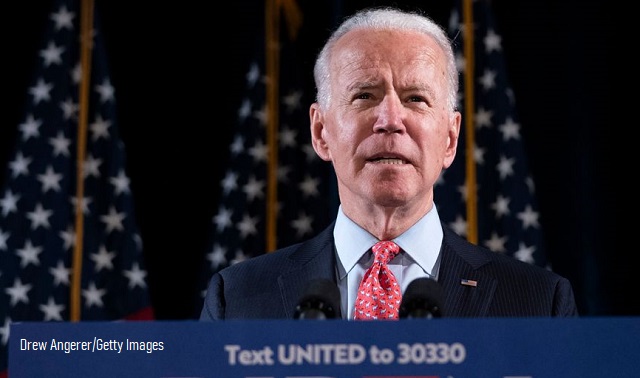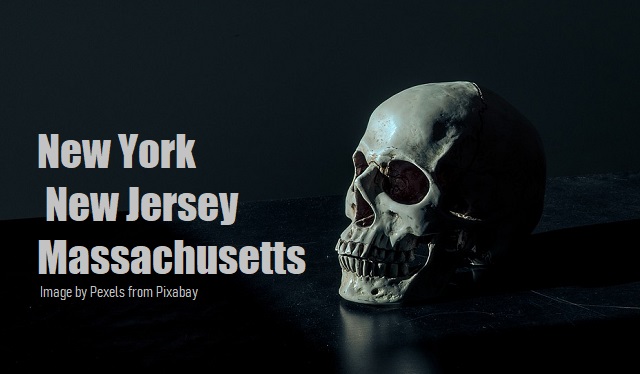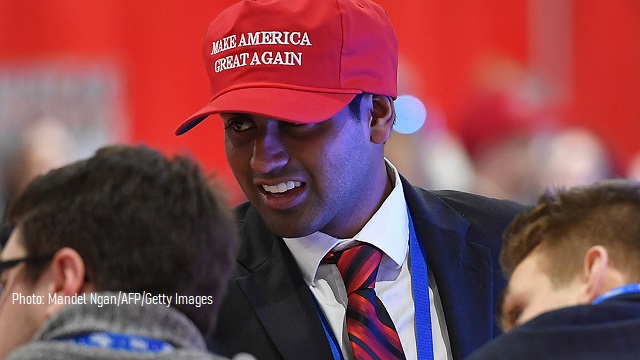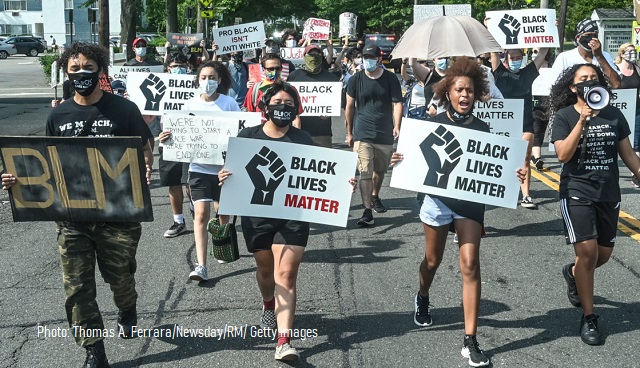PODCAST: New York City Eliminated Its Anti-Crime Unit. Violent Crime Has Surged.
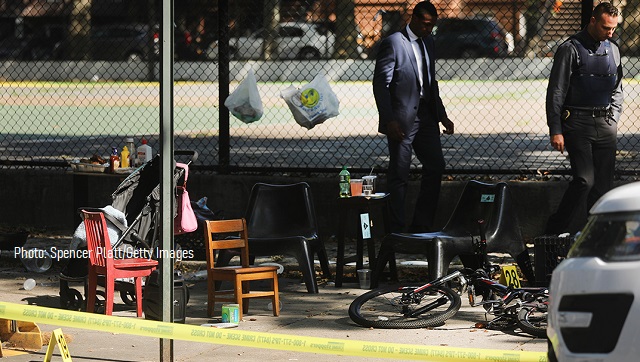
New York City has seen a 53.5% increase in shootings and a 27% increase in killings this year, according to GianCarlo Canaparo, a legal fellow with The Heritage Foundation’s Edwin Meese III Center for Legal and Judicial Studies.
The New York City Police Department disbanded its plainclothes Anti-Crime Unit amid calls to defund the police in the wake of the killing of George Floyd. The increased violence might be a result in part of the city’s decision to disband the unit.
Canaparo joins the show to explain the factors contributing to New York City’s crime spike and what should be done to curb the violence.
We also cover these stories:
Two regimes are fighting an ideological war in America today. But what side are you on? And how can you sharpen up on how to defend your position? Learn more now >>
- House Minority Leader Kevin McCarthy, R-Calif., announced a bill to protect statues and monuments from protesters.
- There is evidence that Russia is trying to hack research about a COVID-19 vaccine from the U.S., U.K., and Canada.
- Georgia Gov. Brian Kemp has put his foot down on the mandating of face masks by cities in the state.
“The Daily Signal Podcast” is available on Ricochet, Apple Podcasts, Pippa, Google Play, and Stitcher. All of our podcasts can be found at DailySignal.com/podcasts. If you like what you hear, please leave a review. You can also leave us a message at 202-608-6205 or write us at letters@dailysignal.com. Enjoy the show!
Virginia Allen: I am joined by GianCarlo Canaparo, Heritage Foundation legal fellow. GianCarlo, thanks so much for being here.
GianCarlo Canaparo: Thanks for having me, Virginia.
Allen: Well, I wish that we were here to talk about happier news today, but we are discussing, really, the frighteningly high spike in violent crime in New York City. Last weekend was a really tragic weekend in New York City. Could you begin by just telling us a little bit about what happened last weekend?
Canaparo: Sure. I’ll start by telling you the story of Davell Gardner. Davell was 1 year old. He was with family and friends at a neighborhood barbecue when unknown assailants drove up, hopped out of their car, and opened fire on the barbecue. They hit three men, wounding them. Thankfully, all of them seem to be fine, but Davell died of his wounds.
The same day, two other children, ages 12 and 15, were shot in Brooklyn and Harlem, and they were among a total of 64 people shot in New York, just this last weekend.
Allen: Wow. And sadly, GianCarlo, this is a trend that we’re seeing right now in New York City. So far this year, New York has seen a 53.5% increase in shootings and a 27% increase in murders. You just wrote a sobering, but really fantastic, piece for The Daily Signal about this crime surge. Could you just give us the big picture of what is going on in New York City right now, as it relates to this rise in violent crime?
Canaparo: Yeah, sure. So far, as of the last time that the NYPD put out stats, which was on the fifth of this month, we’ve seen 528 shootings in New York. Like you said, these numbers are up big time; 50% shooting, 63% shooting victims, almost 30% increase in murders just this year.
This comes following a lot of anti-police protests and riots, as well as New York City’s decision to disband the police force’s anti-crime unit. And New York is not alone in this. We are seeing this trend in a lot of big cities. Chicago is on track to have its most violent year since the mid-’90s. We’ve seen, in that city, 336 murders as of July 2, so this is a really distressing trend of violence throughout America’s big cities.
Allen: You mentioned that the NYPD, they dismantled their anti-crime unit. What did this unit actually do, and what is not happening in New York City right now because of it being disbanded?
Canaparo: Sure. The anti-crime unit was undercover, plainclothes cops assigned to each precinct and city housing. They went after illegal guns, local crime sprees, and focused on burglaries. Incidentally, we’ve seen that burglaries are up 45% in New York this year so far.
The reason that they were disbanded, I think, is because they were involved in more police shootings than other departments, by the nature of what they did, focusing on violent crimes and guns. But what you’ve seen, then, is that the New York Police Department is now deprived of, basically, its first responders to the most violent types of crimes.
Allen: Yeah, I mean, it makes sense that if these are the police officers, like you say, that are in plain clothes and living in the community, probably 99% of the time they’re the first ones that are able to be on those crime scenes and respond.
Canaparo: Right, exactly right. They’re the officers who are going to be there before people know that the police are there or coming, and so they’re going to be in a lot hotter situations than the average officer who comes in sirens blazing after an incident has commenced or finished.
Allen: OK, wow. Right now, there’s a lot of finger pointing going on in the Big Apple, with Mayor Bill de Blasio saying it’s the courts and the courts saying no, it’s de Blasio and the NYPD, and everyone is blaming someone else. Who should actually be held accountable and responsible for this massive crime spike?
Canaparo: Boy, there’s really no shortage of people to blame. We saw earlier this year that New York undertook some criminal justice reforms, including, I think, the consensus in now is that its bail reform was somewhat disastrous. It released a lot of felons for COVID-19 to get them out of prisons because those were vulnerable populations.
We see that there are elements to these Black Lives Matter protests, which are more than just a cry for justice. There is a movement, a Marxist, anti-police, anti-establishment movement behind this motto, which has been encouraging violence and a culture of lawlessness.
We’ve seen that the New York Police Department has, in some cases, not engaged, not put its foot down, which means that people slowly, or rather quickly, actually, learn that there are not consequences to criminal action. So you’ve got this culture of lawlessness and violence that is spinning out of control in New York.
To see this firsthand, you can go online, and, I mean, there are hundreds, if not thousands, of videos, really disturbing videos of just violent lawlessness going on. The sort of thing that a healthy society does not glorify.
Allen: To what extent do you think COVID-19 should be factored into this, to where you have a lot of people out of work, or maybe have less work, and they’re bored or they’re restless? Are they maybe now more prone to get involved in criminal activity?
Canaparo: Yeah, it’s hard for me to say to what extent COVID-19 is affecting this. But … it makes sense intuitively, to me at least, that with the release of criminals from jails for COVID-19 purposes and the fact that people are not otherwise engaged productively with jobs or what have you, it makes sense to me, these are factors that come together and seem to be causing this problem.
Allen: Yeah. Democratic Rep. Alexandria Ocasio-Cortez, whose district includes parts of the Bronx and Queens, she made a very interesting comment that the spike in crime was due to poverty and people not being able to feed their families, so they’re stealing bread.
What does this comment reveal about just how out of touch Rep. Ocasio-Cortez and others, radical leaders on the left, are … with reality?
Canaparo: Sure. Well, first, let me walk through how this conversation started, because there’s a timeline here that affects how people are talking about this.
She gets on a video and she says, “Well, maybe the rising crime has to do with,” like you said, “people feeling the need to shoplift some bread or go hungry,” was her quote.
That statement taken at face value is belied by the evidence. Right? This is not shoplifting. We’ve seen a 53% rise in shootings. We’ve seen murders on the rise. Burglary is on the rise, and to be clear, an increase in people shoplifting for bread would not lead to a rise in burglary stats because New York charges shoplifting as larceny.
Now, larceny stats are actually down in New York. Petite larceny, meaning anything less than $1,000, is down 7.5%. Grand larceny for bigger thefts [is] down 20%. So shoplifting is not what’s leading to this rise in violent crimes.
When she was presented with these facts and got a lot of pushback, she did what she and a lot of politicians often do, which is to retreat from the specific claim into a generality.
She said, “Republicans are just all upset that I’m connecting the dots between crime and poverty,” is what she said. Well, that’s gaslighting, pure and simple. Right? Because, if this was just about poverty, we would expect to see that month over month, recently, these crime stats would be going down because as economies have slowly reopened, we’ve seen the unemployment levels drop quite dramatically, in fact.
By the end of July, unemployment dropped about 5%. It’s still very high. It’s still too high, hovering around 11%, but down significantly.
If her explanation [was correct], crime, poverty are related was the explanation here, we’d expect to see month over month a drop. But, in fact, what we’ve seen is month over month, 165% more shootings, 204% more shooting victims, and 21% more murders, month over month. That causality is backwards.
Even if she’s allowed to retreat away from her specific claim that this is shoplifting, her general claim that this is just the relationship between crime and poverty doesn’t explain what’s going on.
Allen: Wow. Well, New York has showed us that defunding parts of your police department, it doesn’t work. It only leads to more chaos, more crime. But it’s obvious, after the death of George Floyd at the hand of police officer Derek Chauvin that reforms do need to take place and … need to happen.
How should cities and communities across America respond to the death of George Floyd so that another man or woman is not wrongfully killed at the hands of a police officer?
Canaparo: What we need to see from reformists is a commitment to reform based on what we actually know, and not just what we think or feel we know about how police behave.
We need targeted reforms that prevent or punish or eliminate bad actors from within the police forces. But to paint with a broad brush and to simply disband, defund, or eliminate police forces will only encourage bad actors in the community to do what they’re going to do with impunity.
Allen: GianCarlo, to what extent is this a state and local level issue versus something that Congress should take action on?
Canaparo: Oh, it’s almost exclusively a state and local issue because the vast, vast majority of police-citizen interactions are at the state and local level. Federal police forces are not out there on the street dealing with people on a day-to-day basis.
Every community is going to have different needs. Communities that are quieter, communities that have a lot more police presence, they’re going to have different needs and considerations, and how each community interacts with its police force is a deeply local decision.
Allen: Yeah, interesting. New York had terrible crime in the 1970s and Mayor Rudy Giuliani is largely credited with cleaning up crime in the ’90s. Although, his methods have been attacked by some. What is New York City’s history of crime?
Canaparo: In a city like New York, it’s really easy for somebody to get lost in the crowd. That dynamic, that mentality can lend itself well to, in some people, the conception that, “Well, I can commit crime because I won’t get caught.”
What big cities like New York and Chicago need is a police presence that is there, that’s visible, that’s engaged and involved with the community. To cultivate not only a sense that police are there for our protection for the vast majority of people who are good and law-abiding citizens, but also to cultivate amongst people who are not that they are not going to get away with criminal behavior.
Allen: If you could sit down with some of New York City’s leaders today and say, “Hey guys, this is really what we need to implement first. Today, right now, this is what needs to change in order to strengthen that police force and bring this crime surge down,” what would you say to them?
Canaparo: A couple of things. No. 1, again, I would just reiterate that to tackle these issues, we need to be going at it from a data-driven approach—what do we actually know—and not listen to social activists who are espousing of a philosophy that is not necessarily tied to the facts. …
No. 2, there are going to be bad actors within the police forces, like there are bad actors everywhere. We need a system where they can be found out and punished.
Now, one of the problems that police forces face is, as with teachers and other unions, a union can create a lot of stickiness for bad actors in the police force, that they can’t be fired or they can’t be removed from the beat. Those sort of concerns need to be whittled down.
On the other side of the extreme, though, you can’t just get rid of your police forces in an overcorrection because there are always going to be bad actors in the community as well.
You’ve got to find that balance. You need the police engaged with the community, building trust with the community, present in the community. But you can’t divorce from that relationship the fact that police are necessary, most police are good, hardworking people who are just trying to do their jobs.
Allen: We encourage all of our listeners to follow GianCarlo’s work and follow him on Twitter, @gcanaparo. GianCarlo, thank you so much for your time today, just really appreciate your insight on this really important subject.
Canaparo: My pleasure. Thanks, Virginia.
COLUMN BY
Virginia Allen
Virginia Allen is a news producer for The Daily Signal. She is the co-host of The Daily Signal Podcast and Problematic Women. Send an email to Virginia. Twitter: @Virginia_Allen5.
A Note for our Readers:
These are trying times in our nation’s history. Two regimes are fighting an ideological war in America today, with polar opposite viewpoints on public policy and the government’s role in our lives.
Our friends at The Heritage Foundation asked world-class speaker, educator, and researcher David Azerrad to walk you through his research and outline the differences between the “two regimes” in our society today—conservatism and progressivism—and their primary differences.
When you get access to this course today, you’ll learn key takeaways like what it means to be a conservative, what “modern progressivism” is, how a conservative worldview differs from a progressive one, and much, much more.
You will come away from this online course with a better understanding of the differing points of view, how they align with your principles, and how to defend your beliefs.
Don’t wait—start taking “The Case for Conservatism” course online now.
GET YOUR FREE ACCESS NOW »
EDITORS NOTE: This Daily Signal column is republished with permission. ©All rights reserved.

